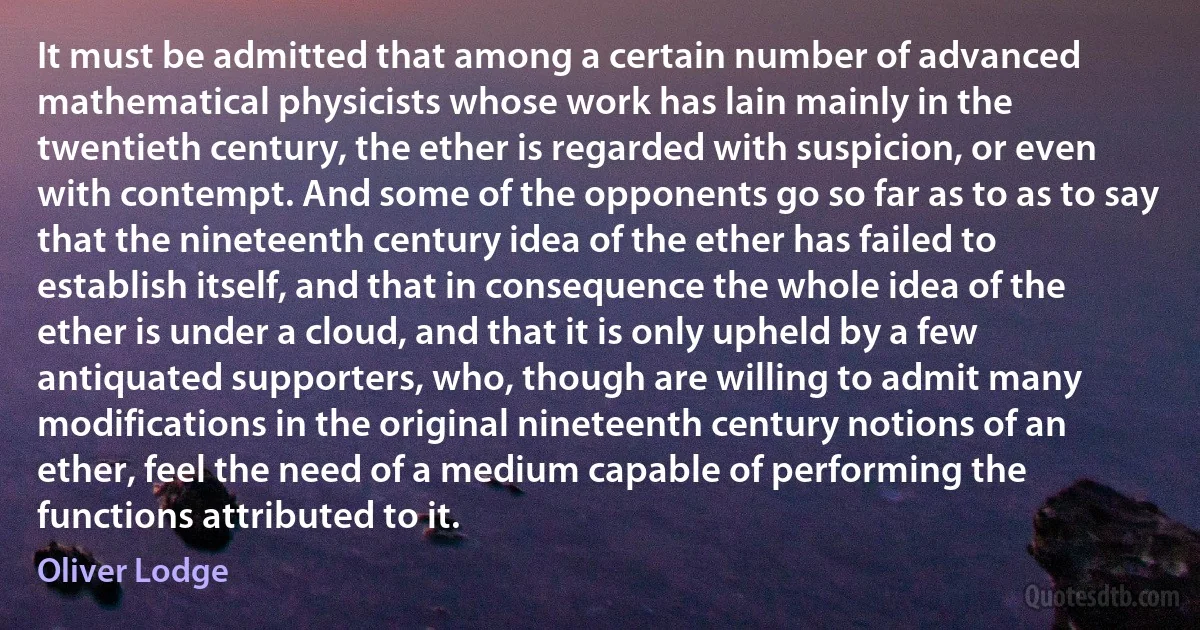
It must be admitted that among a certain number of advanced mathematical physicists whose work has lain mainly in the twentieth century, the ether is regarded with suspicion, or even with contempt. And some of the opponents go so far as to as to say that the nineteenth century idea of the ether has failed to establish itself, and that in consequence the whole idea of the ether is under a cloud, and that it is only upheld by a few antiquated supporters, who, though are willing to admit many modifications in the original nineteenth century notions of an ether, feel the need of a medium capable of performing the functions attributed to it.
Oliver LodgeRelated topics
century certain cloud contempt ether far few idea lie need nineteenth number say suspicion under willing workRelated quotes
Each of the parts of philosophy is a philosophical whole, a circle rounded and complete in itself. In each of these parts, however, the philosophical Idea is found in a particular specificality or medium. The single circle, because it is a real totality, bursts through the limits imposed by its special medium, and gives rise to a wider circle. The whole of philosophy in this way resembles a circle of circles. The Idea appears in each single circle, but, at the same time, the whole Idea is constituted by the system of these peculiar phases, and each is a necessary member of the organisation.

Georg Wilhelm Friedrich Hegel
Don't you drink I notice you speak slightingly of the bottle. I have drunk since I was fifteen and few things have given me more pleasure. When you work hard all day with your head and know you must work again the next day what else can change your ideas and make them run on a different plane like whisky When you are cold and wet what else can warm you Before an attack who can say anything that gives you the momentary well-being that rum does The only time it isn't good for you is when you write or when you fight. You have to do that cold. But it always helps my shooting. Modern life, too, is often a mechanical oppression and liquor is the only mechanical relief.

Ernest Hemingway
During the lifetime of great revolutionaries, the oppressing classes relentlessly persecute them, and treat their teachings with malicious hostility, the most furious hatred and the most unscrupulous campaign of lies and slanders. After their death, attempts are made to convert them into harmless icons, to canonize them, so to say, and to surround their names with a certain halo for the "consolation" of the oppressed classes and with the object of duping them, while at the same time emasculating the revolutionary doctrine of its content, vulgarizing it and blunting its revolutionary edge.'

Vladimir Lenin
Throughout the nineteenth century, apart from the division in theoretical sciences and arts, classifiers attempted to divide the sciences into two groups. Already they had before them the examples of Francis Bacon (speculative and descriptive) and Hobbes (quantitative and qualitative). For Coleridge, the sciences were either pure (Grammar, Logic, Rhetoric, Mathematics, Metaphysics) or mixed. Arthur Schopenhauer's similar groups were called pure and empirical, Wilhelm Wundt in 1887 called them formal and empirical, Globot mathematical and theoretical, and the St. Louis Congress of Arts and Sciences (1904) normative and physical.

Brian Campbell Vickery
There should be open competition for all men; and the most able should not be prevented by laws or customs from succeeding best and rearing the largest number of offspring. Important as the struggle for existence has been and even still is, yet as far as the highest part of man's nature is concerned there are other agencies more important. For the moral qualities are advanced, either directly or indirectly, much more through the effects of habit, the reasoning powers, instruction, religion, &c., than through natural selection; though to this latter agency the social instincts, which afforded the basis for the development of the moral sense, may be safely attributed.

Charles Darwin
